In the heart of Southern India, where percussion rhythms have long been the pulse of diverse music styles, artistes are not only experimenting with sounds but also giving their instruments a new look. For instance, some mridangists have transformed their instruments into canvases. This creative thought was sparked by the recent shift from traditional leather strap-bound mridangams to contemporary versions fitted with nuts and bolts. This transition left expanses of bare wood on the instruments, inspiring these musicians to explore decorative possibilities. The result is a stunning fusion of visual art and a musical tradition, where each drum not only produces different rhythm patterns but also tells a story through its ornate exterior. When these mridangams are placed on stage, they further enhance the concert’s aesthetic appeal.
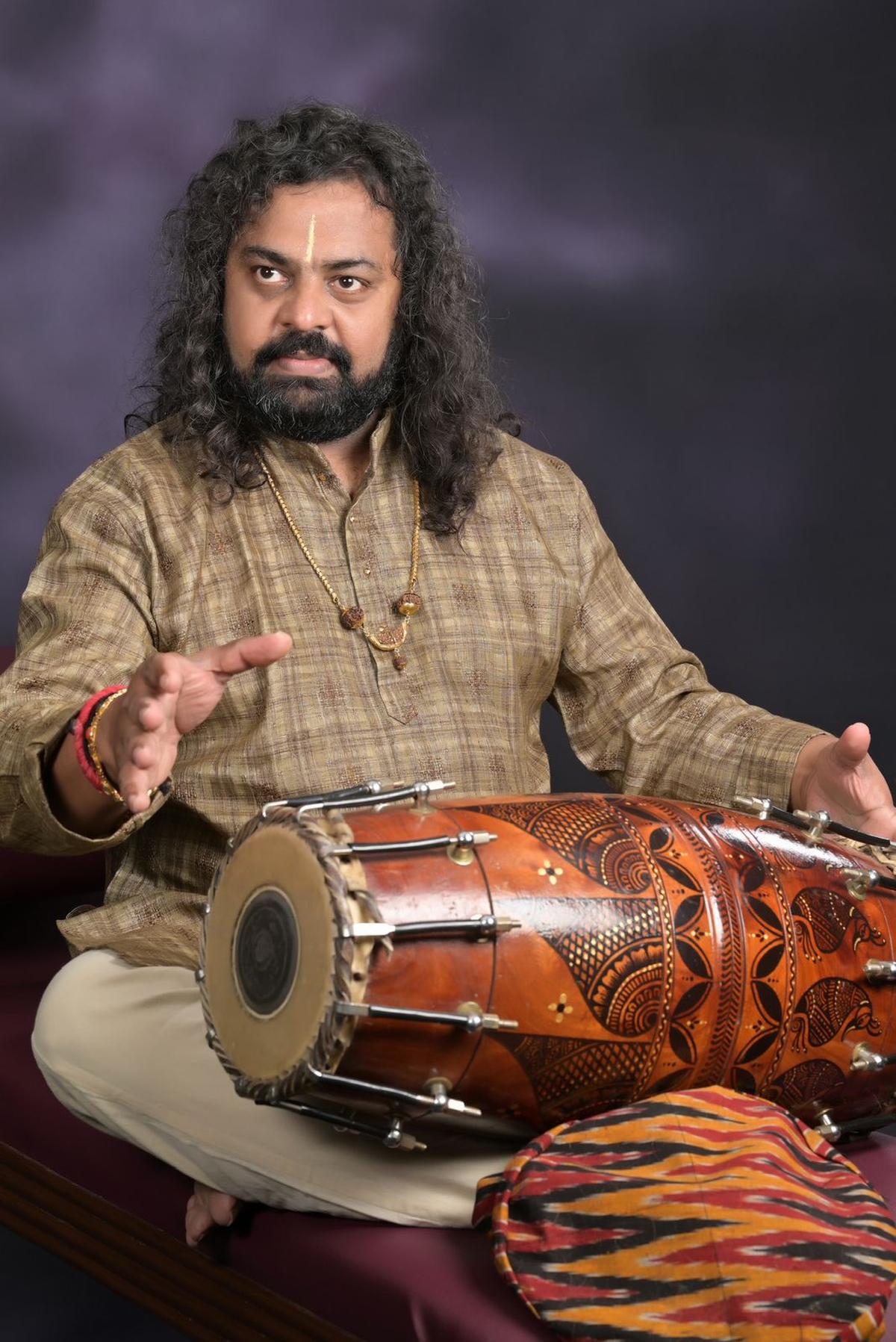
Patri Satiskumar, who pioneered the trend of designer mridangam, enhanced its appearance with beautiful carvings.
| Photo Credit:
Special Arrangement
Virtuoso Patri Satish Kumar, who pioneered this trend a decade ago, even coined the term ‘designer mridangam’. “I wanted to do something for the instrument that has given me an identity. So I thought of enhancing its appearance with beautiful carvings, similar to those done on Hindustani music instruments,” says the senior mridangist.
Over the years, mridangam artistes Jayachandra Rao, Vinod Shyam Anoor, and Nandan Kashyap also took to it.
Patri Satish Kumar’s exquisite and creative designs are inspired by traditional art forms of Warli (Maharashtra), Madhubani (Bihar), Kalighat paintings (West Bengal), patachitra (Odisha) and Kerala murals. They have been meticulously executed by skilled artisans hailing from Thanjavur, Palani, Pune, Kolkata, Bengaluru, Kerala and Mangaluru. “This fusion of regional styles exemplifies India’s rich artistic heritage. Despite the challenge of carving around a round surface, the artistes did a great job,” he says.
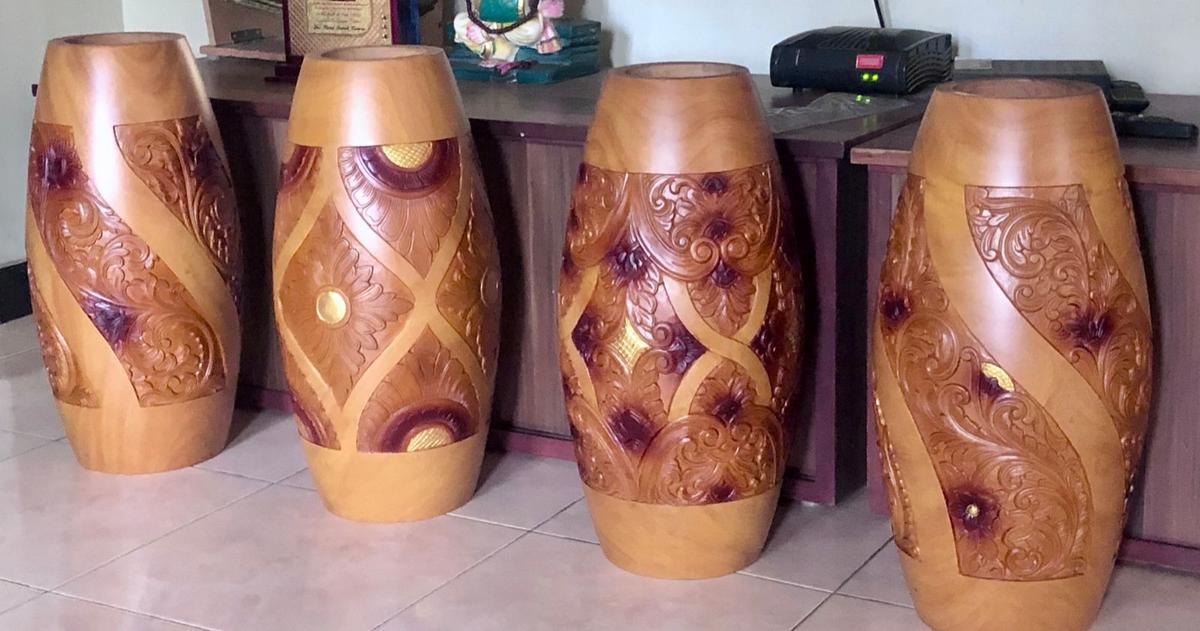
Patri Satishkumar’s mridangam designs are inspired by the traditional art forms of Warli, Madhubani, Patachitra, Kalighat paintings and Kerala murals.
| Photo Credit:
Special Arrangement
So far, he has worked on over 50 mridangams, which are part of his personal collection. The first design was actually inspired by the African drum. The designs that followed featured divine symbols such as the conch, trishul, damaru, the Nandi and geometric shapes. Each pattern was meticulously drawn, carved, and coated with a natural polish blended with earthy colours — brown, black and gold.
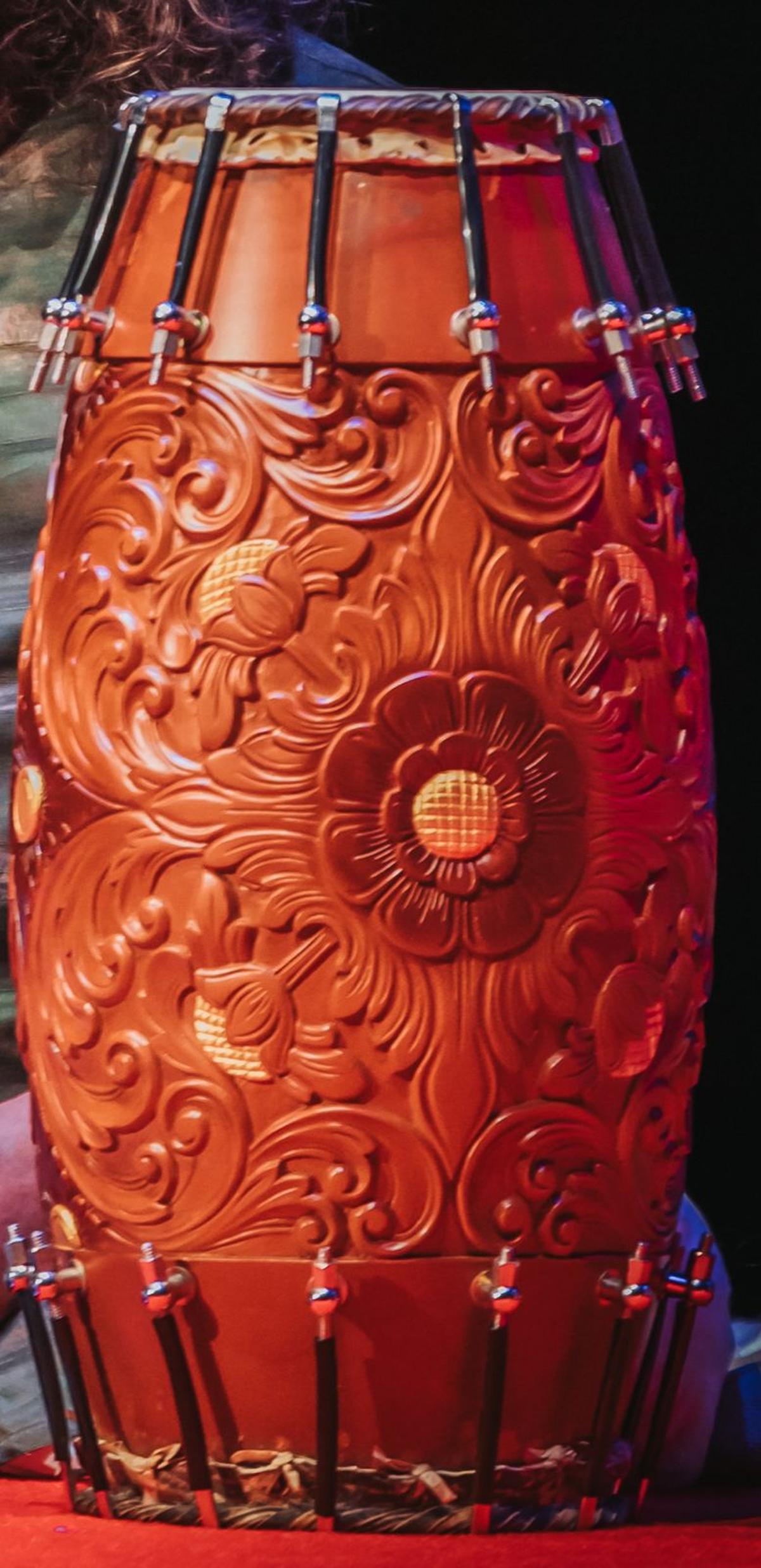
An intricately carved mridangam of Patri Satishkumar.
| Photo Credit:
Special Arrangement
In the process of further elevating the look, the mridangist adorned the instruments with 3D carvings of floral motifs reminiscent of those found on temple pillars.
Jayachandra Rao’s mridangam carries graphic prints.
| Photo Credit:
AKHILA EASWARAN
Jayachandra Rao shares the genesis of his 10 instruments, painted in bright hues themed around Nature, divinity and social messages. He invited a hearing-impaired artisan from Andhra Pradesh to his residence in Bengaluru. “The artist was initially confused as he was painting on a mridangam for the first time. So, he practised working on a cylindrical object for about six months. We exchanged our thoughts through written notes. I was in awe of his art; his execution was par excellence.”
Adds Jayachandra: “During a casual conversation with the artist, I shared my belief that Hari and Hara are the same, and he created a painting featuring a Trishul, a peacock feather, the third eye of Shiva, and Krishna’s naamam. Whenever I perform on these painted mridangams, I always think about him.”
The first mridangam that Jayachandra got painted was done by Bengaluru-based artist Seemanthini, who specialises in Ganjam mural paintings — an art form that originated in Odisha. She painted Nandikeshwar and inscribed the 108 names of the deity in white against a dark blue background. Jayachandra recounts, “For the first few seconds of the concert, I felt odd keeping Nandi on my lap while playing. However, when I saw the aura created by the light’s rays reflecting on Nandikeshwar, I was immersed in bhakti. I heard an inner voice saying, ‘I am your friend. Go ahead and perform’.”
In a pristine, white-walled, acoustically-designed practice space with artefacts and a couple of watercolour paintings on display, Kumuthavalli, Sakthi, Kishen and Lawrence wait. These are the names of Praveen Sparsh’s mridangams, painted by his friend, visual artist and musician Susha. He has thoughtfully named each after individuals who have impacted his life. ‘Lawrence’ honours his mridangam maker. “We exist because of them,” he says. Kumuthavalli is his mother’s name, Kishen his father’s, while Sakthi is dedicated to his sound engineer Prakash.
Little did Praveen, who has a penchant for the abstract, know that the mridangam casually painted for his music video Savari back in 2018 would result in the rest getting splashed with colours.
“I just wanted to give the traditional instrument a different look. I briefed Susha that the painting should signify the trance state of mind of the protagonist in the video. She envisioned Shiva and made an abstract painting using dark blue, red, purple, and yellow,” recalls Praveen.
Praveen has named his mridangams after his parents and friends
| Photo Credit:
Thamodharan B
A recent addition to his collection, a mridangam decorated with geometric patterns and ocean-inspired hues, is dedicated to ‘A Carnatic Quartet’, a five-year-old ensemble featuring Praveen, violinist Shreya Devnath, nagaswaram artiste Mylai Karthikeyan and thavil artists Gummidipundi R Jeeva and Adyar G Silambarasan, alternately. Asked about the significance of the chromatic palette, Praveen says: “It depends on the theme, personality of the person, and pitch of the mridangam.”
The response of the rasikas to these unique mridangams has been overwhelming. Recalling a performance in London, Praveen says, “A rasika said the painting of Shiva on the mridangam made her experience the power of the beats. Jayachandra shares: “Many have even enquired about the reasons and significance behind the designs. This motivates me to constantly think about new visuals. Patri informs that some of his students and rasikas worldwide have even bought some of his mridangams.
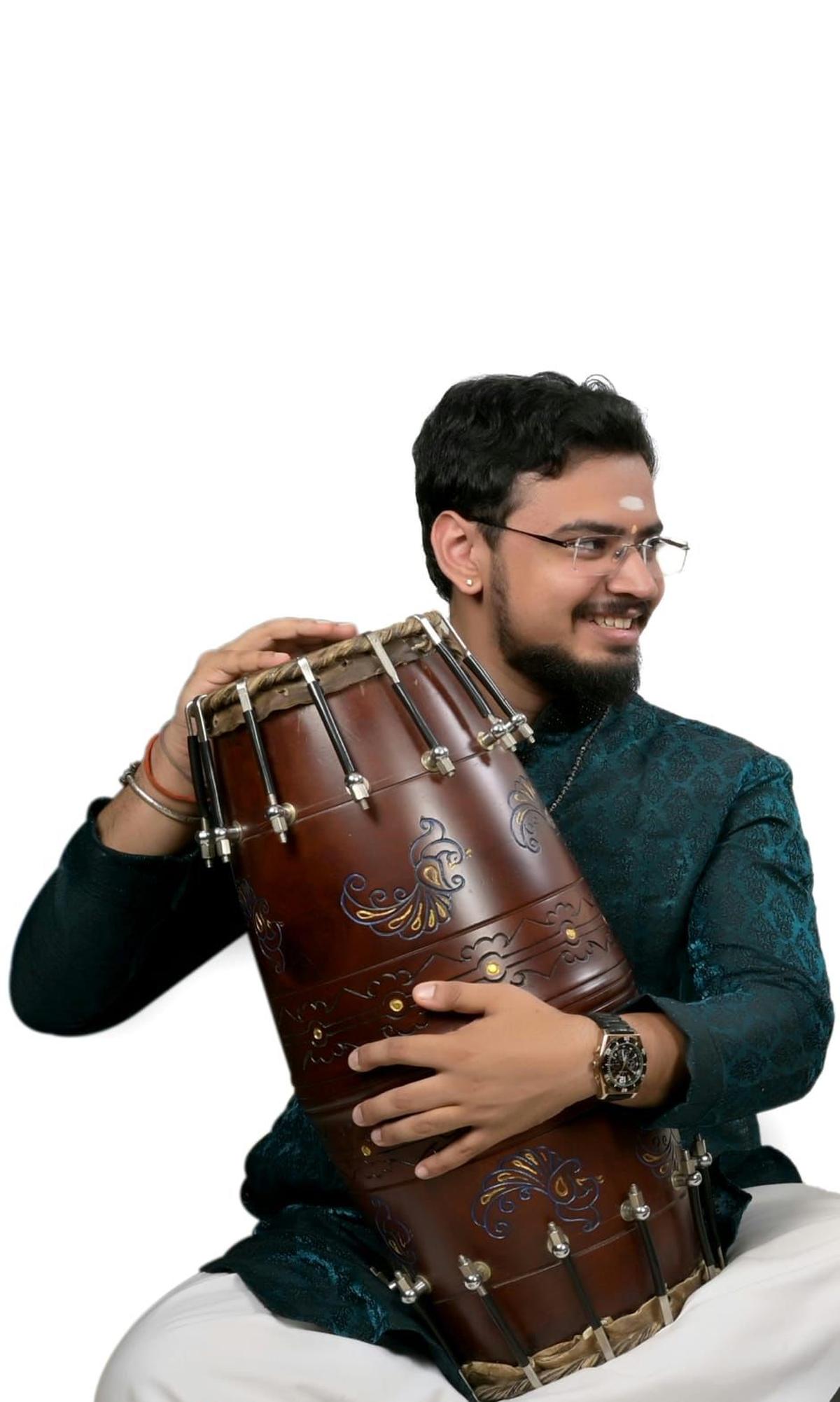
Hariharan, a disciple of Patri Satish Kumar, has imbibed his guru’s love for the fine arts
| Photo Credit:
Special Arrangement
Apart from learning the playing technique, Patri’s students — V Sai Raghavan, Hariharan, Deepika Srinivasan and Yashwant Hampiholi have imbibed this passion. “While playing with Patri sir at a concert in Tirupati, I got the opportunity to play a solo piece titled ‘Chakra’, which inspired me to design a srichakram and trisulam on my mridangam,” he says, adding that one of his students now has a painting of Muruga’s vel (spear) and a peacock feather on the mridangam.
Asked about how veteran percussionists reacted to these artistic interventions, Patri notes that maestros such as Umayalpuram Sivaraman, T.V. Gopalakrishnan and Karaikudi Mani commended the effort. “The artwork has not interfered with the size, wood quality, or alignment of the instrument. It only reiterates how the arts are inter-related and enhance the creative experience,” says Patri Satish Kumar.
Published – October 15, 2024 03:11 pm IST

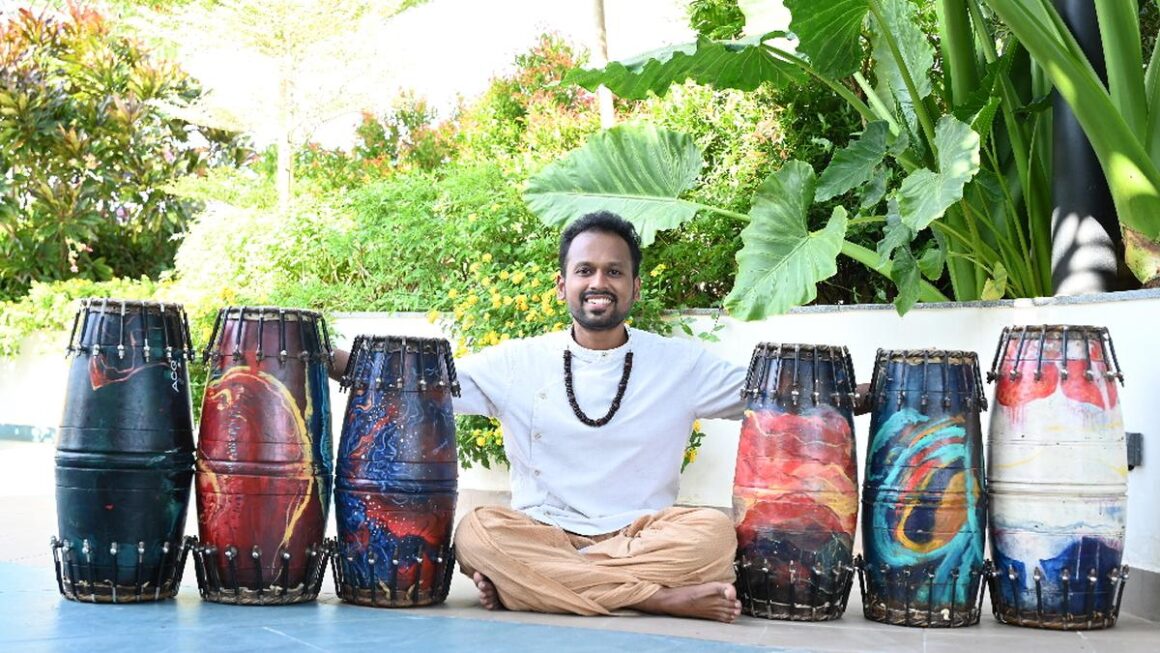
Leave a Reply